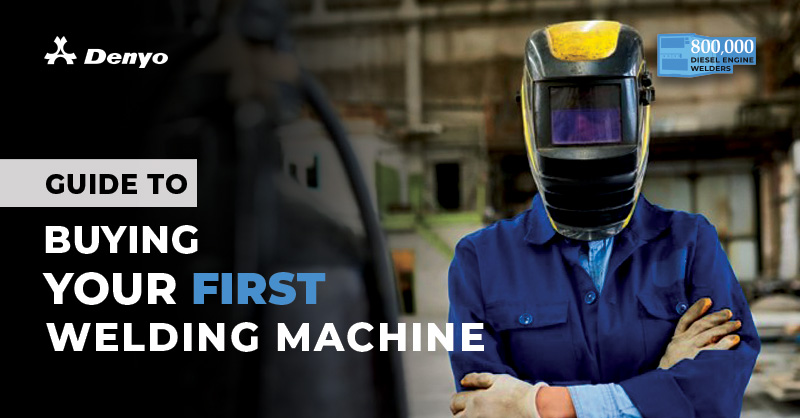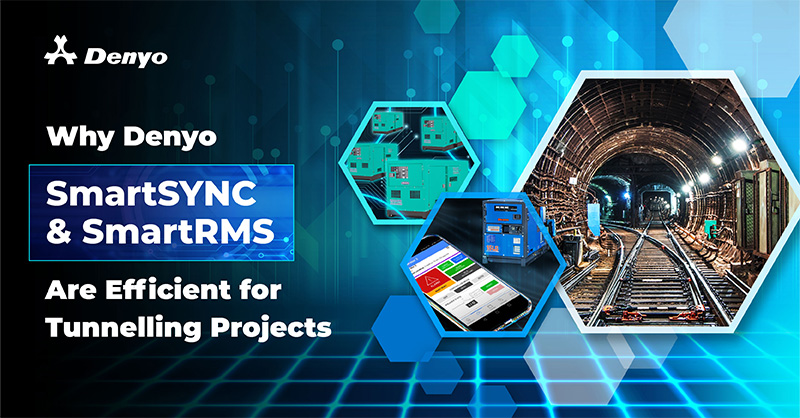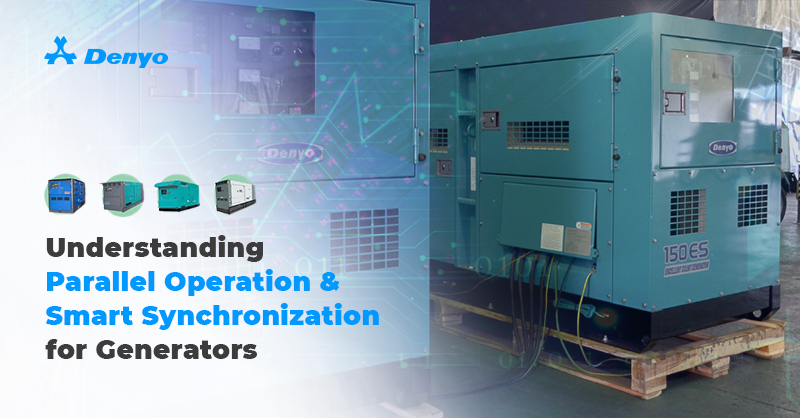A Guide to Buying Your First Welding Machine

There are many welding processes to choose from, each possessing distinct characteristics and suitability depending on the specific application. Hence, it is imperative to assess the most suitable process for your business needs or requirements. Subsequently, you can make an informed decision regarding the most appropriate welding machine to employ.
Factors to Consider When Buying a Welding Machine
At Denyo, we understand the difficulties of choosing a suitable welding machine for your application when various options are available. Here are 4 factors to consider before making your big purchase:
1. Types of Welding Processes
The types of metal you weld play a significant role in your decision-making. Different welding machines have characteristics to perform a unique welding process that makes them suitable for various materials. Therefore it is essential to recognise the four main types of welding processes: Gas Metal Arc Welding (GMAW/MIG), Gas Tungsten Arc Welding (GTAW/TIG), Shielded Metal Arc Welding (SMAW), and Flux Cored Arc Welding (FCAW).
Gas Metal Arc Welding – MIG welding uses a wire welding electrode on a spool fed automatically at a constant pre-selected speed. The arc, created by an electrical current between the base metal and the wire, melts the wire and joins it with the base, producing a high-strength weld with an outstanding appearance and little need for cleaning. MIG can handle almost any weldable metal, the most common being carbon and stainless steel. It is popular due to its speed and efficiency and is most commonly used in construction and automotive industries.
Gas Tungsten Arc Welding – TIG welding uses a non-consumable tungsten electrode to produce the weld. The weld area is protected from atmospheric contamination by shielding gas (usually argon) and filler metal. TIG is often the best process for welding thin and non-ferrous materials, such as steel and aluminium. It is popular due to its precision and control and is most commonly used in the aerospace industry.
Shielded Metal Arc Welding – SMAW welding uses an electric current flowing from a gap between the metal and the arc-welding electrode. SMAW is often used for heavy-duty work involving industrial iron and steel, like carbon steel and cast iron. It is popular due to its simplicity and is most commonly used in pipelines and shipbuilding industries.
Flux Cored Arc Welding – FCAW welding uses heat from an electric arc to fuse base metal in the weld joint area. This arc is struck between the metallic workpiece and the continuously-fed tubular cored consumable filler wire, with the wire and the metallic workpiece melting to form a weld joint. FCAW works well with ferrous metal, such as carbon steel, cast iron, and stainless steel. It is popular due to its efficiency and is most commonly used in the mechanical industry.
If you are looking for a single machine with multiple welding capabilities, you could consider a multi-purpose engine welder, such as the Denyo DLW-500ISW, which is capable of performing different welding processes when combined with dedicated equipment and maximise resources in the field through two independent weld outputs (Dual-operator Welding), thus, improving job productivity.
2. Thickness of Metal
Consider the thickness of the metal used in most of your applications. Thicker metals require higher amperage (A) to create strong welds. Different welding machines have varying amperage ranges, so you must choose one that can handle the thickness of the metal you will be working with. If you work with metals with different types of thickness, a convenient option would be to get a welding machine with a current control system and an amperage range of 40-500. This feature is present in Denyo’s high-performance engine welder, the Denyo DAW-500S. This welding machine can provide stable arc performance for all sizes of welding rods and be used in a wide range of applications, including pipeline construction.
3. Welding Location
The location also impacts the type of welding machine you should purchase. A traditional plug-in type may suffice if you primarily work in a fixed location. Additionally, welding machines may require different voltage levels, so ensure your workspace has the necessary power supply or select one that can accommodate the available voltage. However, if you anticipate needing portability, consider investing in a Denyo engine welder – which mitigates the need for an external power source. With compact designs for manoeuvrability, Denyo engine welders are ideal for remote applications and for those constantly moving from site to site. For beginners at welding, we have a lightweight and compact unit that delivers a current range of 30-180A and has excellent manoeuvrability with its built-in wheels, the Denyo DAW-180SS.
4. Duty Cycle
The duty cycle, typically represented as a percentage, is a welding equipment specification which defines the number of minutes, within a 10-minute period, during which a given welding machine can safely produce a particular welding current. For example, the Denyo DAW-180SS is rated at a 50% duty cycle and can operate for five minutes out of every ten before needing a cool-down period. With the wide range of Denyo engine welders, several units have a 100% duty cycle, such as the Denyo DLW-300LS, that allows you to sustain welding at a given amperage output for an extended period without rest or downtime. This is made possible by adopting high-performance alternators and allowance-rich engines in our units.
Choose Denyo A Welding Machine As The First Unit You Purchase
Denyo welding machines offer many benefits for infrastructure projects and other welding applications. With sustainability in mind, Denyo engine-driven welding machines are designed with a closed breathing system that keeps the blow by gas in the machine. Additionally, the aluminium radiator does not cause pollution and has satisfied the emission regulation stage 2. As such, choose a brand that ensures high performance with sustainability and safety in mind.
For more information about our Denyo welding machines, visit our Denyo Welder Virtual Tour or contact us for a non-obligatory discussion today.


